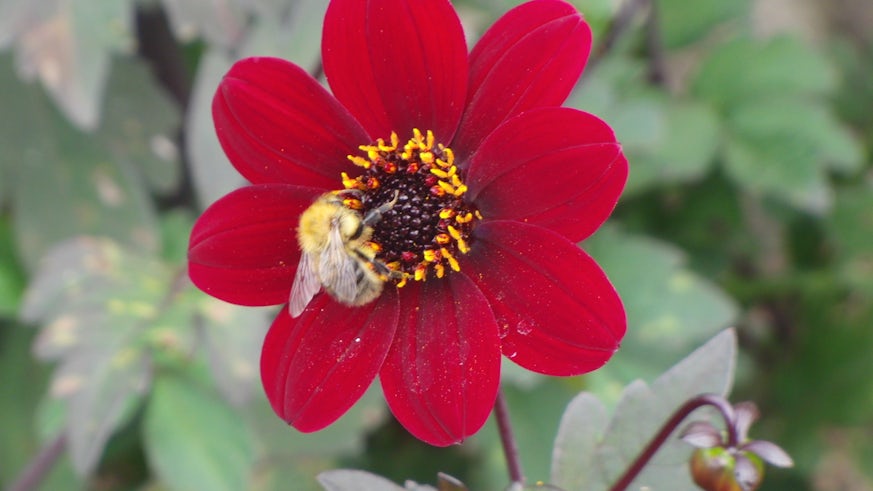Pharmabees
29 October 2015

Scientists from Cardiff University’s School of Pharmacy and Pharmaceutical Sciences and the National Botanic Garden of Wales have been working together to identify plant-derived drugs which could be used to treat antibiotic resistant hospital pathogens.
Numerous species of bacteria have become resistant to antibiotics over the past few decades, so there is an increasing need to prevent and control the emergence and spread of antimicrobial-resistance in hospitals.
Funded through the Knowledge Economy Skills Scholarships (KESS), Dr Jenny Hawkins has carried out research for a PhD project that uses honeybees to help source natural antibacterial properties in plants. Professor Les Baillie from Cardiff University’s School of Pharmacy and Pharmaceutical Sciences led the microbiology aspects of the project.

For thousands of years, honey has been used to treat sore throats, wounds and infections, due to compounds present in the honey that kill bacteria. These properties are the result of a range of factors including the phytochemicals donated by the plants. The contribution of these phytochemicals to the overall antibacterial activity of a particular honey depends on the properties of the plants visited by the bees. For example, Manuka honey from New Zealand is produced when bees forage on the Manuka bush (Leptospermum scoparium), a plant that produces a compound with potent antibacterial properties. The search to identify other antibacterial phytochemicals has led to the screening of honey produced by bees that have fed on plants from a variety of UK habitats.
“Our plan was to employ bees as private investigators and to send them out to interview every flowering plant in the country. During each visit, they collect a forensic material in the form of nectar containing phytochemicals – some of which may be antibacterial – and pollen which holds the DNA fingerprint of the plant,” Dr Hawkins explained.
Dr Hawkins and the team took the antibacterial analysis of 250 samples of honey and DNA barcoded 20 of these. They were successful in using bees as a natural drug discovery tool. Compounds were present in honey found in the back garden of a beekeeper from Tywyn in Gwynedd that can kill microorganisms and combat MRSA.
By breaking the DNA code, the team could find out which plants the bees are using to create the honey. The top 20 plants in antibacterial honey have been identified, along with other novel drugs that are currently in the process of analysis.
Using the knowledge from this project,it is possible to create a special honey by leading bees to plants with strong antibacterial elements. Dr Baillie and his team are now trying to put these plants in as many places as possible for the bees to feed upon. They plan to use a grass meadow on the rooftop of St David’s 2 shopping centre in Cardiff, where they can place beehives, to see if bees will produce honey with antibacterial properties. They are also engaging with the community in Grangetown in Cardiff and hope to find a new use for a disused bowling green by creating a new habitat for bees there, too.
Professor Arwyn Jones from Cardiff
University’s School of Pharmacy and
Pharmaceutical Sciences worked with
Julian Rees from Pollen8 Cymru to
expand the reach of the project, and
organised a large science exhibition in
the Science and Technology Pavilion
at the 2014 National Eisteddfod of Wales in Llanelli. Welsh
beekeepers were
invited to take 200g honey samples to the Eisteddfod to help widen the
study of honey from around Wales.
The project also incorporates the Barcode Wales project, led by the National Botanic Garden of Wales and supervised by Natasha de Vere, and has created DNA bar codes for 1,143 indigenous flowering plants and conifers in Wales.
Cardiff Urban Honeybee Project
Prof Les Baillie is looking for teams of students to work on this live project taking the product to market. The project will explore the feasibility of establishing an urban honey company based in Cardiff which will produce and market medicinal honey produced from bees that have been fed on plants identified by research from the University. More information and application form.
Professor Les Baillie was interviewed for the Radio 4 programme “Inside Science” (9.30 mins in) broadcast on the 29th October. He talked about the Pharma Bees, the DNA mapping of plants (carried out in collaboration with The National Botanic Gardens of Wales) and the honey research (PhD project of Jenny Hawkins).